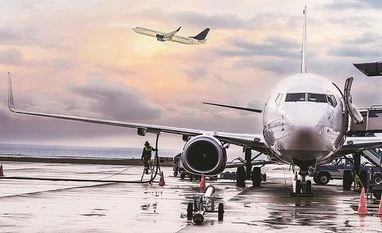The US Senate offered struggling airlines unprecedented aid worth $58 billion that will helping cover their staff wages, as carriers around the world seek state support and turn passenger planes into cargo liners in their desperate bid for revenues.
The coronavirus crisis has ravaged the travel industry and grounded many of the world's planes, prompting governments to take previously unthinkable steps to prevent bankruptcies, ranging from state handouts to temporarily halting competition rules.
"For airlines, it's apocalypse now," said Alexandre de Juniac, director general of the International Air Transport Association (IATA), which represents carriers around the world.
"Travel restrictions and evaporating demand mean that, aside from cargo, there is almost no passenger business," he said.
IATA, which estimates the pandemic will cost the global industry $252 billion in lost revenues this year, said it had written to 18 countries in the Asia-Pacific region, including India, Japan and South Korea for emergency support for carriers.
Airlines UK, representing carriers in Britain, asked the government for tax and air traffic fee holidays.
The US Senate passed an industry aid package, half in the form of grants to cover some 750,000 employees' paychecks. Companies receiving funds cannot lay off employees before Sept. 30 or change collective bargaining agreements.
The bill has restrictions on stock buybacks, dividends and executive pay, and allows the government to take equity, warrants or other compensation as part of the rescue package.
The US House of Representatives is expected to back the move on Friday. President Donald Trump has promised to sign it.
United Airlines Holdings said capacity would drop by 68% in April and Alaska Air Group said it would cut its schedule by 70% in April and May. American Airlines suspended its dividend, drew down a $400 million credit line and secured an additional loan.
Cutting jobs
In Asian countries, Singapore, Australia and New Zealand have announced some financial relief for airlines, but this has not stopped carriers from putting staff on leave and grounding planes.
Singapore's finance minister Heng Swee Keat said Singapore Airlines Ltd would soon announce "corporate action" supported by state investor Temasek Holdings to tackle the crisis. Share trading in the carrier, which said this week it was seeking extra funds, was halted on Thursday.
Virgin Australia plans to permanently cut more than 1,000 jobs among the 8,000 staff that have already been stood down. Australia's Flight Centre Travel Group said it would cut 6,000 travel agent roles globally.
In a move unthinkable under normal conditions, Australia's competition regulator said it would allow Virgin, Qantas Airways and Regional Express to coordinate flight schedules and share revenue on 10 regional routes.
"We hope that this temporary measure will also support airlines' ability to again compete with each other on these routes once the pandemic crisis has passed," Australian Competition and Consumer Commission Chairman Rod Sims said.
In bid to raise revenue and keep some planes flying, Delta Air Lines and Air New Zealand joined others in offering cargo flights and charters on passenger planes.
About half of the world's air cargo normally travels in the bellies of passenger planes, so the cancellation of passenger flights has led to a sharp reduction in cargo capacity.
"We've shared these options with our global cargo customer base and are getting some strong interest from customers wanting to ship to and from Shanghai, Hong Kong, San Francisco, Los Angeles, Sydney and Melbourne," said Rick Nelson, Air New Zealand's general manager for cargo.
Abu Dhabi's Etihad Airways said it would operate 34 weekly cargo-only flights with Boeing 787 Dreamliner passenger jets to India, Thailand, Singapore, Philippines, Indonesia and South Korea.
Hawaiian Airlines said it had added more cargo-only turboprop flights between the state's islands.
Roughly 1,800 planes had been grounded globally on Monday and Tuesday, according to aviation research firm Cirium.
Financial stimulus The Republican-led Senate approved the massive bill - which would be the largest fiscal stimulus measure ever passed by Congress - by 96 votes to none late on Wednesday, overcoming bitter partisan negotiations and boosting its chances of passing the Democratic-majority House.
The unanimous vote, a rare departure from bitter partisanship in Washington, underscored how seriously members of Congress are taking the global pandemic as Americans suffer and the medical system reels.
“When there’s a crisis of this magnitude, the private sector cannot solve it,” said Senate Democratic Leader Chuck Schumer.
“Individuals even with bravery and valor are not powerful enough to beat it back. Government is the only force large enough to staunch the bleeding and begin the healing.”
The package is intended to flood the country with cash in a bid to stem the crushing impact on the economy of an intensifying epidemic that has killed more than 900 people in the United States and infected at least 60,000.
It follows two others that became law this month. The money at stake amounts to nearly half of the total $4.7 trillion the U.S. government spends annually.
Republican President Donald Trump, who has promised to sign the bill as soon as it passes the House, expressed his delight on Twitter. “96-0 in the United States Senate. Congratulations AMERICA!” he wrote.
Only two other nations, China and Italy, have more coronavirus cases than the United States. The World Health Organization has warned the United States looks set to become the epicenter of the pandemic.
Unlock 30+ premium stories daily hand-picked by our editors, across devices on browser and app.
Pick your 5 favourite companies, get a daily email with all news updates on them.
Full access to our intuitive epaper - clip, save, share articles from any device; newspaper archives from 2006.
Preferential invites to Business Standard events.
Curated newsletters on markets, personal finance, policy & politics, start-ups, technology, and more.
)